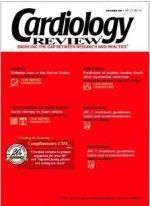Publication
Article
Case report: Anticipating outcomes based on ECG status
A 73-year-old man presented with a history of crescendo angina during the preceding week. This culminated in a 20-minute bout of chest pain that awoke him from sleep and prompted him to go to a small community hospital without interventional capabilities. His clinical examination revealed a normal blood pressure and pulse and an S4 gallop at the apex. No other abnormalities were found. An electrocardiogram (ECG) showed diffuse ST and T-wave changes with up to 2 mm of ST-segment depression maximal in lead V5 (figure A). Cardiac troponin and creatine kinase-MB were negative.
The patient was treated with anti-ischemic and antithrombotic medicines with a good clinical response. He was ambulated without return of discomfort and discharged on hospital day 4 with follow-up arrangements to see a cardiologist in a tertiary care center. His ECG at discharge
(figure B) showed persisting, but less marked, ST and T-wave changes. The patient had recurrent pain associated with a non—ST-segment elevation myocardial infarction that occurred
5 days after discharge. He again went to the community hospital and was triaged to a tertiary care center. Invasive studies showed severe proximal triple vessel disease. The patient underwent successful coronary bypass surgery 48 hours later.
Conclusion
This case emphasizes the prognostic utility of a repeat ECG obtained close to the time of discharge in patients with acute coronary syndromes, and the need for increased suspicion in such instances.
